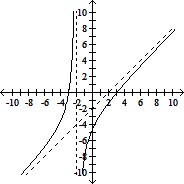Find the probability.A digit is chosen randomly from the digits 0 through 9 and then 6 is added to the digit and the sum recorded. Find the probability that the sum is less than 8.
A. 
B. 
C. 
D. 
Answer: C
You might also like to view...
Find the inventory values using (a) the weighted-average method, (b) the FIFO method, and (c) the LIFO method. Round final answers to the nearest dollar.PurchasesNow in InventoryBeginning inventory: 600 units at $3.72June: 750 units at $4.47December: 550 units at $2.31889 units
A. (a) $3,209 (b) $2,786 (c) $3,524 B. (a) $3,209 (b) $3,524 (c) $2,786 C. (a) $3,112 (b) $3,974 (c) $2,786 D. (a) $6,855 (b) $3,307 (c) $2,054
Identify any vertical, horizontal, or oblique asymptotes in the graph of y = f(x). State the domain of f.
A. Vertical: x = -2; oblique: y = x + 2; (-?, 2) ? (2, ?) B. Vertical: x = -2; oblique: y = x + 2; (-?, -2) ? (-2, ?) C. Vertical: x = -2; oblique: y = x - 2; (-?, -2) ? (-2, ?) D. Vertical: x = 2; oblique: y = x - 2; (-?, 2) ? (2, ?)
Factor completely. If the polynomial is prime, state this.x2 - 10x + 25
A. (x - 5)(x + 5) B. Prime C. (x - 5)2 D. (x + 5)2
E ( X )
The probability density function of X is f (x) = 4/x5 over [1, x= ?). Compute the quantity.